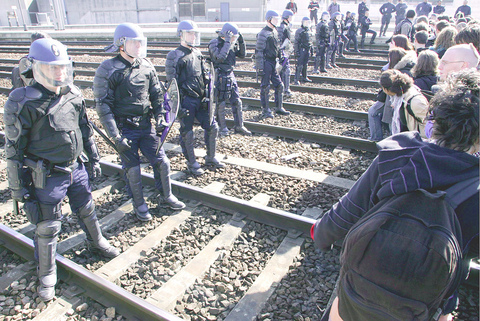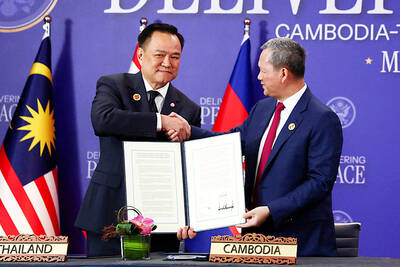Some 2,000 angry students massed on railroad tracks in Paris on Thursday, stopping international train traffic in a new push to force a contested youth labor law off the books. But France's equally combative prime minister refused to say whether the measure would be repealed.
Dominique de Villepin, calling for calm, spoke more clearly about his own destiny, brushing off growing speculation that he would resign.
President Jacques Chirac "gave me a mission, and I will lead this mission to the end," Villepin told a news conference. "All the rest is pure speculation and fantasy."

PHOTO: EPA
Stepping up wildcat disruptions with high-profile protests, students set up a pre-dawn blockade that stopped a convoy of parts for the Airbus A380 jumbo jet, the crown jewel of European aviation.
Students paralyzed all trains at the Gare du Nord station in Paris for nearly two hours, blocking arrivals and departures including Eurostar runs to and from London and the Thalys to Belgium, the Netherlands and Germany. Some 200 police in riot gear moved them out, allowing thousands of passengers packed into the station to start their travels.
Protesters earlier occupied the tracks of another Paris station, the Gare de l'Est, for an hour. In the evening, about 40 protesters temporarily blocked a northern section of the circular highway around Paris.
There was some violence during the evacuation of some 450 students blocking rails at a train station in the southwest city of Toulouse, and four protesters and a police officer were hospitalized with head traumas and other injuries, officials of the local prefecture said. The officer had been hit with a stone. The Sud railway workers union denounced the force used by police as "totally out of proportion."
There were protests elsewhere in France, from the eastern city of Strasbourg, where several hundred students blocked the Pont de l'Europe bridge that links France and Germany, to the Brittany city of Rennes.
"This is very irritating, but I can understand it," said John Ring, a 40-year-old French businessman at Paris' Gare du Nord who was trying to get to The Hague. "What I can't understand is how the government would allow the situation to get to this point."
While continuing to justify the reasons behind a reform aimed at denting sky-high joblessness among the young, Villepin said he was listening to the voices of discontent.
As the crisis over the jobs law that gained steam in the middle of last month rolled on, lawmakers from the governing UMP party met for a second day with unions and students in search of a way out. Protesters are demanding the measure be withdrawn.
"The immediate priority, as we all know, is restoring calm," Villepin said.
"It is time to get out of the crisis," he said, adding that classes should resume ahead of exams.
The jobs law, which aims to encourage hiring by making it easier to fire youths, has inspired disruptive protests at hundreds of universities and high schools and spurred massive demonstrations that have ended in violence by a few troublemakers.
The law is designed to inject flexibility into the country's rigid labor rules. It originally provided for a two-year trial period during which employers could fire youths under 26 without cause. Protesters say it would make young employees easy to get rid of.
Villepin for weeks relentlessly defended the jobs law, until Chirac handed the problem to lawmakers from his party.
In a maneuver to save face for Villepin, Chirac signed the controversial measure into law last weekend -- but ordered the talks.
Villepin refused to prejudge the outcome of negotiations, saying "we will draw conclusions together" and "make the necessary choices to combat unemployment."
He backed down several notches from his inflexible stance of the past.
"I am pragmatic. In this time of dialogue it is important to be open," he said. "I am listening."
But the prime minister insisted that the 23 percent rate of youth unemployment that climbs above 50 percent in depressed, heavily immigrant suburbs, is at the heart of "French difficulties." It was a major cause in triggering riots by suburban youths last fall.
"It is my responsibility, as head of the government, not to allow such a situation to go unanswered," he said. "Our country today needs action."

Shamans in Peru on Monday gathered for an annual New Year’s ritual where they made predictions for the year to come, including illness for US President Donald Trump and the downfall of Venezuelan President Nicolas Maduro. “The United States should prepare itself because Donald Trump will fall seriously ill,” Juan de Dios Garcia proclaimed as he gathered with other shamans on a beach in southern Lima, dressed in traditional Andean ponchos and headdresses, and sprinkling flowers on the sand. The shamans carried large posters of world leaders, over which they crossed swords and burned incense, some of which they stomped on. In this

‘NO COUNTRY BUMPKIN’: The judge rejected arguments that former prime minister Najib Razak was an unwitting victim, saying Najib took steps to protect his position Imprisoned former Malaysian prime minister Najib Razak was yesterday convicted, following a corruption trial tied to multibillion-dollar looting of the 1Malaysia Development Berhad (1MDB) state investment fund. The nation’s high court found Najib, 72, guilty on four counts of abuse of power and 21 charges of money laundering related to more than US$700 million channeled into his personal bank accounts from the 1MDB fund. Najib denied any wrongdoing, and maintained the funds were a political donation from Saudi Arabia and that he had been misled by rogue financiers led by businessman Low Taek Jho. Low, thought to be the scandal’s mastermind, remains

Near the entrance to the Panama Canal, a monument to China’s contributions to the interoceanic waterway was torn down on Saturday night by order of local authorities. The move comes as US President Donald Trump has made threats in the past few months to retake control of the canal, claiming Beijing has too much influence in its operations. In a surprising move that has been criticized by leaders in Panama and China, the mayor’s office of the locality of Arraijan ordered the demolition of the monument built in 2004 to symbolize friendship between the countries. The mayor’s office said in

FIGHTING CONTINUES: Thai military dropped 40 bombs on border areas, Cambodia said, while Bangkok said Phnom Penh launched heavy attacks and damaged homes Cambodia yesterday accused Thailand of intensifying its bombardment of disputed border areas, even as officials from the two countries attend a multi-day meeting aimed at negotiating an end to deadly clashes. The neighbors’ long-standing border conflict reignited this month, shattering an earlier truce and killing more than 40 people, according to official counts. About 1 million people have also been displaced. Cambodian and Thai officials were in their third day of talks at a border checkpoint, with ministers of defense from the two countries scheduled to meet today. However, the Cambodian Ministry of National Defense said Thailand’s military carried out a heavy